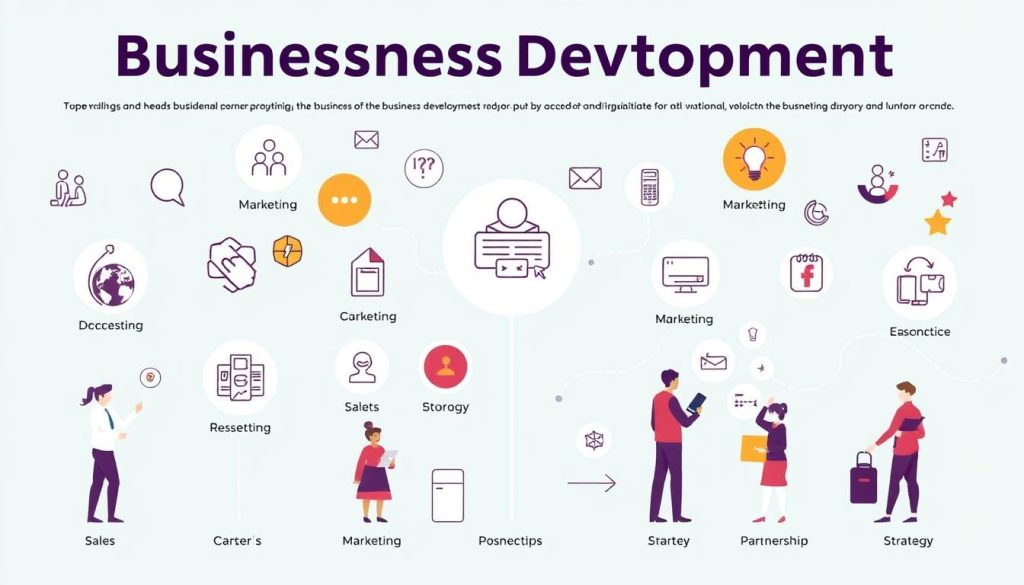Embarking on a career transition can be both exhilarating and intimidating. As professionals seek to navigate the complexities of the modern marketplace, understanding the pivotal role of business development becomes essential.
In today’s fast-paced business environment, identifying new markets and strategic opportunities is crucial for organizational growth and sustainability. Business development serves as the driving force behind this growth, enabling companies to expand their reach and enhance their offerings.
As you consider a transition into this dynamic field, it’s vital to grasp how business development differs from traditional sales and marketing roles, while complementing these functions to create holistic growth strategies.
Table of Contents
Key Takeaways
- Understand the critical function of business development in driving organizational growth.
- Learn how business development differs from and complements sales and marketing roles.
- Discover the skills required to excel in business development across various industries.
- Explore the importance of business development for career advancement.
- Gain insights into creating holistic growth strategies through business development.
Understanding Business Development in Today’s Market
As businesses continue to evolve, the role of business development has become more significant, focusing on creating long-term value through strategic relationships and market expansion. In today’s interconnected business landscape, understanding the intricacies of business development is essential for professionals aiming to make a meaningful impact.
Defining Business Development vs. Sales and Marketing
Business development is often misunderstood as being synonymous with sales and marketing. However, it encompasses a broader scope, focusing on long-term value creation through strategic partnerships and market exploration. While sales teams concentrate on closing deals with identified prospects, business developers identify untapped opportunities and create pathways to new revenue streams. Similarly, marketing teams generate demand and position products, whereas business development builds strategic partnerships and explores new market segments.
The distinction between these roles is crucial for professionals to understand, as it helps them identify where their skills best fit and how they can contribute most effectively to an organization’s success.
The Strategic Importance of Business Development
The strategic importance of business development has grown significantly as markets become more competitive and businesses seek differentiation beyond traditional product offerings. By linking all functions and departments of the company, business development seizes business opportunities, driving growth and expansion. It serves as the bridge between various organizational functions, aligning them toward growth objectives.
In essence, business development is about identifying new business areas, such as new markets, new distribution channels, and partnerships, thereby creating a robust business strategy that fosters sustainable growth and competitiveness.
Core Responsibilities of a Business Developer

Business developers are essential for identifying new opportunities and implementing strategies to capitalize on them. Their role is central to driving business growth and involves a range of critical responsibilities.
Strategic Vision and Planning
A key responsibility of a business developer is to craft and implement a comprehensive business plan that aligns with the organization’s goals. This involves developing a strategic vision that is adaptable to market changes. Effective business developers must be able to balance short-term needs with long-term objectives, ensuring sustainable growth and success.
Market Analysis and Opportunity Identification
Business developers must conduct thorough market analysis to identify new opportunities and understand industry trends. This requires both quantitative data assessment and a qualitative understanding of the competitive landscape. By analyzing consumer segmentations and emerging markets, business developers can identify new growth drivers to exploit.
Client Acquisition and Relationship Management
Acquiring new clients and managing existing relationships is crucial for business growth. Business developers must develop strategies that balance immediate revenue generation with long-term relationship building. This involves understanding client needs and delivering value through tailored solutions, ultimately driving chiffre affaires and expanding the company’s entreprise presence in the market.
Essential Skills for a Successful Business Development Career
The profession of business development necessitates a broad spectrum of skills. A business developer must be equipped with both technical skills and soft skills to excel in their role.
Technical Skills and Knowledge
A business developer should possess technical proficiency in CRM systems, data analytics, and industry-specific tools. These technical skills form the foundation of a business developer’s toolkit, enabling them to analyze data, understand market trends, and manage client relationships effectively.
Soft Skills and Personal Attributes
Equally important are soft skills like negotiation, active listening, and persuasive communication. A business developer must have good interpersonal skills and be a good speaker to negotiate effectively with clients. Being a good salesperson is crucial for practicing the profession of business development. The ability to understand client needs and build strong relationships is vital.
Adaptability and Resilience in Business Development
Business developers must be adaptable and resilient in the face of rejection and setbacks. The role involves high-stakes situations with potential failure, requiring a personality that likes to push limits. Adaptability is crucial as market conditions and customer expectations evolve.
| Skill Type | Essential Skills | Importance |
|---|---|---|
| Technical Skills | CRM systems, data analytics | High |
| Soft Skills | Negotiation, active listening | High |
| Personal Attributes | Adaptability, resilience | High |
Business Development Roles and Career Paths

Understanding the different roles within business development is crucial for career advancement. Business development encompasses a range of positions that drive company growth through strategic planning, market analysis, and client acquisition.
Common Business Development Positions
Business development includes several key roles, each with distinct responsibilities. These roles are vital to the success of a company’s growth strategy.
Business Developer (BizDev)
A Business Developer, or BizDev, manages the entire sales cycle to increase company turnover and activity. They are often found in smaller organizations or startups.
Business Development Manager (BDM)
The Business Development Manager oversees the application of commercial acquisition strategies and typically manages a small team of salespeople, particularly in service companies.
Business Development Representative (BDR)
A Business Development Representative focuses on prospecting outbound leads at the beginning of the business development process.
Career Progression Opportunities
Career progression in business development often follows a path from representative to developer to manager. Professionals can specialize in particular industries or market segments, and experienced individuals can transition into executive roles like Chief Revenue Officer or Chief Growth Officer.
For more insights on boosting your career, visit our blog post on career development.
Transitioning into Business Development

To become a business developer, one must understand the educational pathways and transferable skills required. Business development is a dynamic field that requires a combination of strategic thinking, market analysis, and relationship management.
Educational Pathways and Training Options
Formal education is a crucial step in becoming a business developer. Employers typically look for candidates with a Bac+3 or Bac+5 profile from a reputable business school. Specialized bachelor’s and master’s programs in business, marketing, and entrepreneurship provide a solid foundation. For instance, a Master’s in Business Development or Entrepreneurship can be highly beneficial. Professional certifications and targeted training programs also offer accelerated routes for career changers.
Some institutions offer formation programs tailored to business development, enhancing one’s compétences in this field.
Leveraging Transferable Skills from Other Professions
Many successful business developers transition from adjacent fields like sales, marketing, or account management, leveraging their transferable skills. Former consultants, project managers, and entrepreneurs often excel in business development roles due to their strategic thinking and relationship management abilities. Technical professionals can also transition by combining their domain expertise with newly acquired business development skills. This diverse range of backgrounds is valued in business development teams, leading to more innovative growth strategies.
By understanding the requirements of the métier business and acquiring the necessary formation, individuals can successfully transition into this rewarding career.
Tools and Strategies for Effective Business Development

To succeed in business development, professionals need to leverage cutting-edge tools and strategies that streamline their workflow. Business Development requires special attention during almost the entire sales cycle, making it essential to have monitoring and data processing tools to facilitate the development of the commercial strategy.
These tools enable a structured and organized approach to both internal expectations (team, company) and external factors (customers, competition). A Customer Relationship Management (CRM) system is crucial as it brings together all the information needed for prospecting or generating leads.
CRM Systems and Data Analytics
Modern CRM systems serve as the central nervous system for business development operations, tracking prospect interactions, pipeline progress, and relationship history. Data analytics tools enable business developers to identify patterns, predict market movements, and make evidence-based strategic decisions rather than relying on intuition alone.
Productivity and Automation Tools
Automation technologies streamline repetitive tasks like initial outreach, follow-up communications, and reporting, allowing business developers to focus on high-value strategic activities. For instance, you can explore more about leveraging such tools on business development platforms.
Effective business developers balance technology utilization with personal relationship building, recognizing when human interaction adds more value than automated processes. By integrating various tools, business developers can create powerful ecosystems that provide comprehensive visibility into the entire business development process.
Conclusion: Building a Successful Future in Business Development
The future of business development looks promising, with a high demand for skilled professionals. As markets globalize and technologies advance, the role of business developers becomes increasingly crucial.
Business development continues to evolve, offering numerous opportunities for professionals who are adaptable and committed to continuous learning. The increasing strategic importance of business development within organizations has elevated these roles, with more business developers joining executive leadership teams.
For professionals considering a transition into business development, the combination of high demand, transferable skills requirements, and clear progression paths makes it an attractive career option. As organizations face complex growth challenges, business developers who can navigate ambiguity while delivering measurable results will be particularly valued.
By understanding the business landscape and leveraging développement affaires strategies, professionals can achieve significant croissance in their careers. Becoming a Business Developer means giving oneself the choice to do what one wants, for whom one wants, making it a highly rewarding métier.
FAQ
What are the primary responsibilities of a business developer?
A business developer is responsible for creating and implementing strategies to drive growth, identifying new sales opportunities, and managing client relationships to increase revenue and expand the company’s market share.
How does business development differ from sales and marketing?
Business development focuses on long-term growth through strategic planning, market analysis, and client acquisition, whereas sales is primarily concerned with converting leads into customers, and marketing involves promoting products or services to potential clients.
What skills are essential for a successful business development career?
Key skills include strategic thinking, market analysis, communication, negotiation, and relationship management, as well as technical skills such as CRM systems and data analytics.
Can professionals from other fields transition into business development?
Yes, professionals from various backgrounds can transition into business development by leveraging their transferable skills, such as sales, marketing, or project management experience, and acquiring additional training or education as needed.
What are the typical career progression opportunities for business developers?
Business developers can progress to senior roles such as director of business development, VP of sales and marketing, or even CEO, depending on their performance and the company’s growth.
How do CRM systems contribute to effective business development?
CRM systems help business developers manage client relationships, track sales interactions, and analyze data to identify new opportunities and optimize their sales strategies.
What is the average salary for a business developer?
Salaries vary based on factors such as location, industry, and experience, but business developers can typically earn a competitive salary with bonus structures tied to their performance and sales targets.





